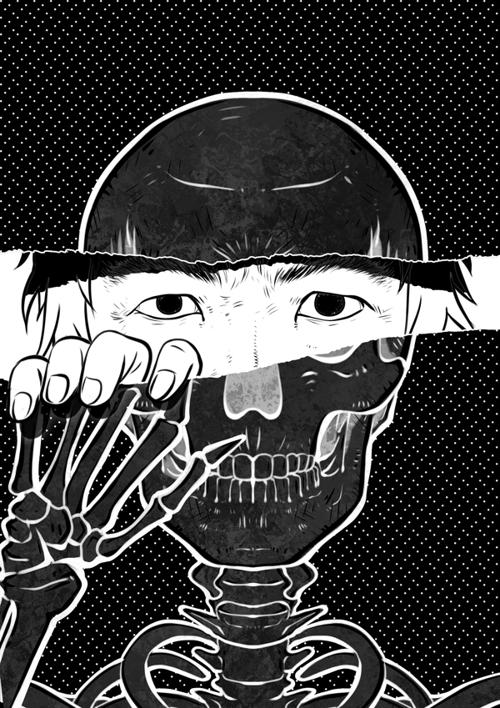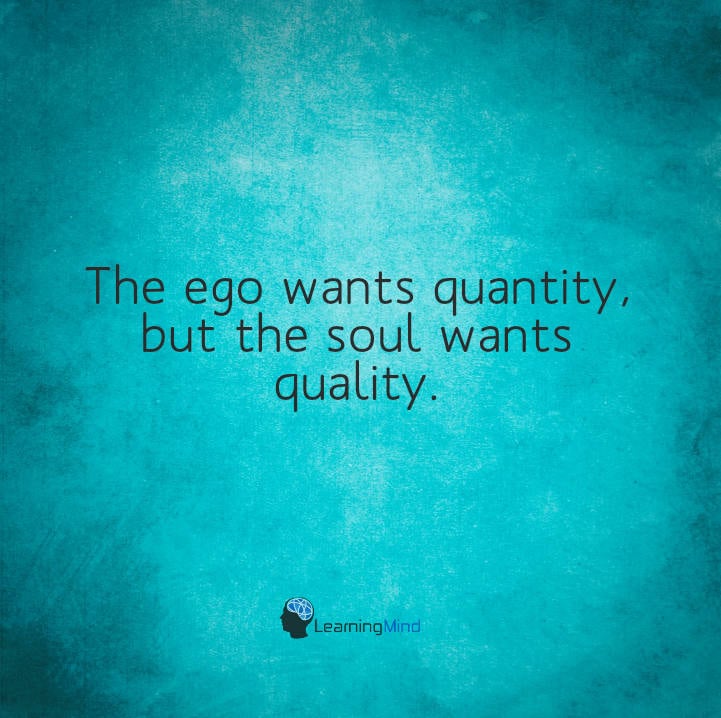Ego death has been a part of the human spiritual experience for centuries. As a matter of fact, humans have sought it, feared it, loved it, or regretted it in equal measure. In addition, it is inseparably connected with the human spiritual journey or searched for spiritual awakening.
Before we delve deeper into ego death, the different interpretations of this phenomenon and ways to achieve it, let’s take a look at the ego itself. More importantly, why do some people feel the need to transcend it?
What is the Ego?
In the first place, the ego is our self-constructed sense of identity. It is the amalgamation of our mental construct of the self and of our social conditioning.
Because the ego represents a self-definition of our identity, it actively controls and affects our behaviour. This is usually through opposition and duality. In other words, I am this, they are that; good versus evil; wrong versus right; acceptable versus unacceptable.
Since the ego defines us in opposition to the world around us, when we live according to the ego, we perceive ourselves as separate, individual entities. For this reason, the ego rejects and locks away what it deems ‘wrong,’ ‘bad,’ or ‘unacceptable.’
By the same token, it distances us both from others and specific aspects of our self. As a result, this repression of what is ‘wrong’ within ourselves fuels what is called the ‘Shadow Self,’ the sum of the parts of us that don’t see the light of day.
Living according to the ego can often result in feelings of anxiety, depression, dissociation, and isolation. Consequently, this can force people to seek more for themselves.
When traditional medicine and lifestyles don’t bring out the best in us, we are pushed towards alternative and spiritual solutions. Ultimately, we gravitate to explore aspects of our self which were previously neglected.
What Is Ego Death?

People come to ego death through a variety of methods. In particular, with intention and purpose through yogic, Buddhist or other spiritual practices. Not to mention the use of psychedelics.
Sometimes it can happen almost by accident, by merely questioning their reality or lining up their actions with their truths.
There is a range of interpretations and traditions surrounding ego death. For example:
- State Enlightenment described in Eastern religion
- Self-surrender and transition associated with the Hero’s Journey in most ancient mythologies
- The psychic death signifying a shift to one’s true nature and purpose in Jungian psychology
- The temporary loss of sense of self linked with the use of psychedelic drugs.
Ego death is also a common basis amongst many religions worldwide, from Buddha’s Ascension to Christ’s Rebirth. Although these traditions seem to come from all corners of the globe, they have many commonalities.
All of them, in one form or another, to one extreme or another, view ego death as the realisation that ‘I,’ one’s self-identity, is only a perception.
It’s important to note that, in the long-term, the use of psychedelics has been shown to have little-to-no worthwhile long-term relation to this state of awareness.
In actual fact, it results in far more negative experiences such as manic depersonalisation, panic attacks, and depression. That is to say, psychedelics are simply a short-cut to achieve what meditation, yoga or soul-searching build up to.
Through a gradual, or mind-blowing cerebral experience, the part of our brain responsible for the sense of self quietens down. Subsequently, we learn to live without the influence of the ego.
To put it another way, as we begin to experience our true nature in its most raw form, we gradually come to be in touch with our whole being.
This shift in our consciousness can be a terrifying experience
Nevertheless, this can be terrifying in and of itself. Not only because it requires letting go of the feeling that something is ‘wrong’ or ‘unacceptable,’ but also embracing our true nature in its entirety.
Another terrifying element that accompanies the shattering of our constructed self-identity is the realisation that the ‘I’ is not, in fact, a separate entity. Because of ego death, we achieve consciousness of connection. That is to say, we feel a oneness with the human, material and spiritual world around us.
Thus, ego death culminates in the loss of attachment to our sense of self and the realisation of our true nature.
In the beautiful words of Jin Y Park:
“I become nothing, and find out that I am everything.”
Are you experiencing ego death?
How can you tell if you are in the process of shedding your mental construct of the self? For one thing, there are a few signs which show you might be on your own path to shattering your ego and reaching spiritual enlightenment.
1. The dark night of the soul
You are, have or have been going through what is called the Dark Night of the Soul. There is a void in your life. From depression, anxiety, feelings of being lost and purposeless.
There is a general discomfort in your life that pushes you to ask questions like ‘Who am I?’ and ‘Why am I here?’ You know something significant and meaningful has to happen, but the despair of not knowing what, or how, feels overwhelming.
2. You’ve been drawn to explore or experiment with spirituality and different spiritual practices.
You’ve suddenly found yourself interested in meditation, yoga, Eastern medicines, the natural world, or anything else that links your existence with the world around you. Likewise, exploring these philosophies feels like a balm against the discomfort in your Soul.
3. You become more aware
You’ve noticed how your ego, your thoughts and your social conditioning control you. In addition, you’ve begun to observe your own mind, liberating yourself from the ego’s influence and acknowledging that you are not your thoughts.
4. Old obsessions, acquaintances and friendships are losing their attraction.
You are slowly disconnecting from your old identity, conditioning and reality. Equally, you’re having an increasingly difficult time conforming as past illusions lose their hold over you.

The ego wants quantity, but the soul wants quality.
-Unknown
5. You start to feel the connection
You’re becoming increasingly aware of the oneness and connection between all things in the Universe. As a result, you no longer feel isolated and separate but as though you are part of a larger whole.
Final Thoughts on Ego Death
Finally, if you recognise yourself here, you are on a beautiful path to spiritual awakening. Surround yourself with positivity, grow your Soul through whatever spiritual practices work best for you.
To summarise, when ego death occurs, don’t give in to the fear that often accompanies the first glimpses of Enlightenment. More importantly, when the time comes to surrender, to let go of the ego and trust what you don’t know, do so.





its weard to opserve myself when i notesing being in free flow i just left flow state the key is to not tink what others tink thats a trap love the self know the self en your on your way to become a budha
oke psygedelics helps aswel for instence canabis is a spirit if your frecency is at a match to the herb plant it can help you its like a gate keeper betwean the normal and the unseen i became clairsentient i feel music i feal energy aura,s intensions al cind of great stuff to explore deeper
im one of the explores that walk where no ways are
Mark Leary, Ph.D., author of, The Curse of the Self, does a great job defining ego as the part of us that makes decisions, arbitrating between the superego (what we believe is good) and id (what we naturally want). He also defines egotistical, egoism, and egocentric in a Psychology Today article that essentially recognizes ego as self-inflated, self-interest and self-centered, respectively. While there are similarities to the definition of ego provided in this article, the most significant difference is the conflation of Ego and Superego, “the ego is our self-constructed sense of identity. It is the amalgamation of our mental construct of the self and of our social conditioning.” The Superego is our social conditioning, are Ego is the part of us that must arbitrate between it and our natural urges (Id).
That said, the rest of the article make sense, but this change in definition makes a significant difference with the implications, to consciously decide on what’s best with one’s ego, or kill it and rely on one’s natural and spiritual sides instead. If you remove the ego, you remove the arbitrator, and you essentially throw out the superego too because the id will usually prevail. If you trust your spirit to lead, you transcend it all and begin to lose self entirely, as this article rightfully describes, but make no mistake, you are letting go of self….
There is another way to experience those symptoms without giving up self, however, and that is what I refer to as Fully Engaged, where someone embraces it all, mind, body and spirit. You don’t give up yourself, you need it to effectively combine all three, and you certainly need an arbitrator to recognize conflicts, compare to reality, and determine which one is more closely aligned. If your ego trusts it’s spirit more, it will rely on it more too, but it also knows how the id can pretend to be the spirit, and it has to make sure the body is taken care of when the spirit wants to take flight. Fully Engaged is more difficult than Spiritual, and therefore requires more effort, but instead of taking the easier way by killing self, make the best of what you have been given by including mind, body and spirit in all you do…with the help of your ego.
I’m just simply here, carpe diem…
I think I had a long ego death experience. I’m carrying my bible with me everywhere I go now. I think it might happen again or that they happen throughout ones life. If it does happen I will have my bible handy. I am also reading books on Schelling, Fichte, Kant, Plato, and others to make sure that if I go through the experience once more it will be done rationally, philosophically and through Jesus.